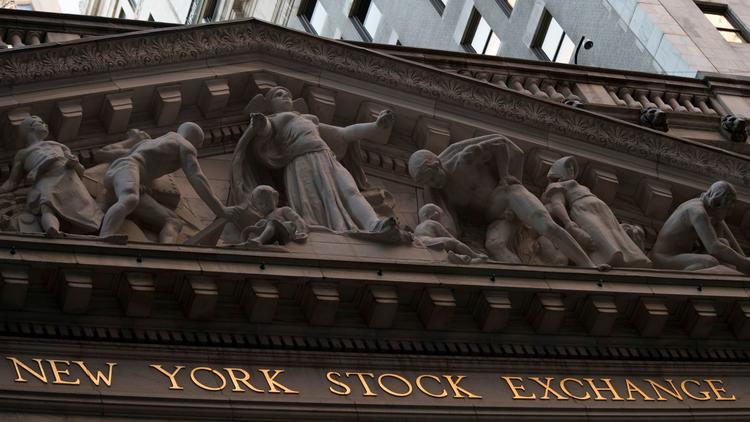|
Mary Altaffer / Associated Press
Stocks clambered higher Wednesday for their biggest gain in two weeks and easily absorbed the Federal Reserve’s latest increase in interest rates, a move that was widely expected. What was perhaps unexpected was the big drop in bond yields and the dollar’s value against other currencies after the Fed’s announcement. The central bank emphasized that it plans to move gradually and stuck to its projection that it will raise rates a total of three times this year. That cooled speculation among some investors that the Fed could move more aggressively. The Standard & Poor’s 500 index jumped 19.81 points, or 0.8%, to 2,385.26. It had been up through the day, and the gains accelerated immediately after the Fed made its announcement. The Dow Jones industrial average rose 112.73 points, or 0.5%, to 20,950.10. The Nasdaq composite climbed 43.23 points, or 0.7%, to 5,900.05. The Russell 2000 index of small-company stocks jumped 20.45 points, or 1.5%, to 1,382.83. Gains were widespread, and seven stocks rose on the New York Stock Exchange for every one that fell. The Fed raised short-term interest rates by a quarter of a percentage point, its third such move since the end of 2015. The move was widely expected after various Fed officials gave speeches telegraphing the increase and reports showed that the economy continues to strengthen and inflation has picked up. The data have been so encouraging that some investors began to speculate whether the Fed may raise rates more aggressively. The yield on the two-year Treasury note, which is heavily influenced by changes in Fed policy, jumped on expectations for Fed action, for example. It climbed nearly a quarter of a percentage point in a little more than two weeks to 1.38% late Tuesday. When the Fed said that it’s sticking with its forecast for three rate increases this year, the two-year yield gave up nearly half of that increase in just a few minutes. It later pared its loss and sat at 1.29% late Wednesday. The yield on the 10-year Treasury fell to 2.49% from 2.60%, and the 30-year yield fell to 3.11% from 3.18%. Both remain higher than they were a few weeks ago, though. The dollar’s value likewise sank as some traders got out of deals built on the expectation of a more aggressive Fed, said Nate Thooft, senior portfolio manager at Manulife Asset Management. The dollar sank to 113.39 Japanese yen from 114.72 yen. The euro rose to $1.0713 from $1.0632, and the British pound climbed to $1.2301 from $1.2145. “People got ahead of themselves,” Thooft said. “That’s a pretty big move off something that seems to be, ‘This is what we told you we were going to do.’ ” The drop in bond yields shined a warm light on stocks in industries known for paying relatively big dividends. Lower bond yields make the income provided by dividends more attractive, and real-estate investment trusts in the S&P 500 jumped 1.9%. Utilities rose 1.6%. The day’s biggest gains came from energy stocks. Those in the S&P 500 rose 2.1% after the price of oil climbed Wednesday, the first time oil prices have risen in more than a week. A barrel of benchmark U.S. crude rose $1.14 to $48.86. The 2.4% jump was the largest since January. Brent crude, which is used to price international oils, rose 89 cents to $51.81 a barrel. The weaker dollar also helped to lift prices for metals. Gold settled at $1,200.70 per ounce, down $1.90. But it climbed after the Fed’s announcement and was trading at $1,221 late Wednesday. Silver and copper also rose after the announcement. Natural gas rose 4 cents to $2.98 per 1,000 cubic feet, heating oil rose 2 cents to $1.51 per gallon and wholesale gasoline was flat at $1.58 per gallon. The Commerce Department said early Wednesday that retail sales inched up 0.1% in February, and it said sales in January were better than it previously believed. However, delays in tax return payments may be holding spending back somewhat. The Labor Department said consumer prices were 2.7% higher in February than a year earlier. After excluding the costs of food and energy, inflation was 2.2%. That’s above the 2% target set by the Federal Reserve. A housing market index by the National Assn. of Home Builders surged to its highest level since 2005. Los Angeles homebuilder KB Home climbed 2.1% to $18.91. Rubicon Project dived 27.8% to $6.06 after the Los Angeles digital ad exchange operator forecast a first-quarter loss and lower sales than Wall Street expected. In overseas trading, the German DAX stock index rose 0.2%, the British FTSE 100 index rose 0.1% and the CAC 40 in France was up 0.2%. Japan’s Nikkei 225 stock index lost 0.2%, and South Korea’s Kospi was little changed. The Hang Seng in Hong Kong edged down 0.1%. Article by Associated Press.
0 Comments
Leave a Reply. |
AuthorGenna Walsh Archives
February 2020
Categories
All
|


 RSS Feed
RSS Feed
